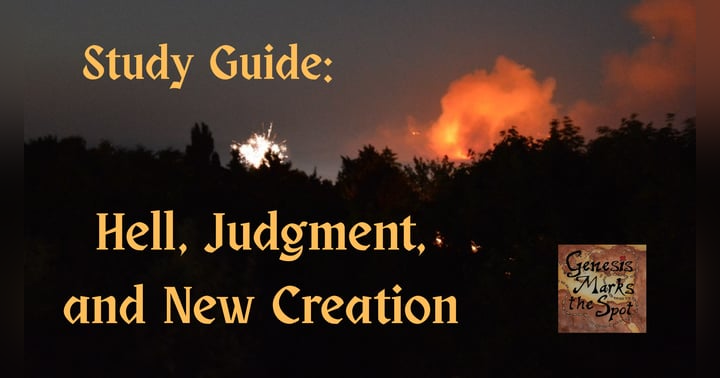The Sethite View: A Case Study in Misguided Exegesis

“The sons of God without a shadow of a doubt were the Sethites.” — H.C. Leupold
Let’s be honest: when someone firmly establishes their argument with “without a shadow of a doubt,” it’s a bit of a red flag (just slightly)--especially in theology. Though it's not necessarily always wrong to say, someone should really take some effort to investigate such claims. And the person making such claims should know they need need need to be backed up by firm evidence. (If you're interested...one that I'd actually agree with is the statement that "you can't use the Bible to calculate the day of creation." But that's a whole conversation itself.)
In the case of Leupold’s popular but problematic interpretation of Genesis 6, the need for biblical theology, anchored in textual and contextual integrity, couldn’t be more obvious.
I'm going to tackle his claim first (because frankly that's more interesting to us), and the problems with it, and then I'll lay out who Leupold was, just so you know and also so we can grant him a bit of grace here, too. Because for sure not everything he said was terrible. So please don't think I'm trying to poison the well against him.
But...as I like to say...ideas have traction. And ideas can and should be evaluated on their own merits or demerits. That's our goal here.
The Passage in Question
Genesis 6:1–2 (Leupold’s paraphrase):
“The sons of God saw the daughters of men that they were fair and they took to themselves wives, whichever they liked best.”
Leupold insists that these "sons of God" are the Sethites, descending from the "godly line" detailed in Genesis 5. He builds his argument around this assumption and attempts to validate it through selective use of Scripture and some "logical" interpretive leaps.
Quoting Leupold: What’s His Argument?
Leupold lays out his core claim clearly:
“But who are these ‘sons of God’? Without a shadow of doubt, the Sethites... Such men merit to be called the ‘sons of God’ (benê ’elohîm), a title applied to true followers of God elsewhere in the Old Testament Scriptures.”
What follows is a string of references to passages like Psalm 73:15, Deuteronomy 32:5, and Hosea 1:10. But here’s the thing: not a single one of these texts actually use the Hebrew phrase “sons of God.” Not a single one. Leupold even admits this:
“Grammatically, the very expression ‘sons of God’ does not happen to be used in reference to them in that very form.”
So the argument amounts to: It doesn’t say it, but it might as well have—which is... not exactly solid exegesis.
Missteps and Misuse: Parsing the "Logic"
Leupold dismisses the well-attested divine being (angelic) interpretation by claiming angels have not been mentioned yet in Genesis. This is, of course, irrelevant to the linguistic and cultural backdrop of the term “sons of God” (benê ʾelohîm), which clearly refers to divine beings in Job 1:6, 2:1, and 38:7.
Worse still, he tries to reframe the “daughters of men” as a collective of humanity, arguing that:
“Whether these fair ones are Sethite or Cainite means nothing to them. That is the sad moral indifference that the author emphasizes.”
But this interpretation completely depends on the prior assumption that "sons of God" means Sethites—an assumption not derived from the text itself. (The reason people do this, of course, is because of the genealogy that we have in Genesis 5 which contrasts with the genealogy of Genesis 4, but it's fully and completely an interpretive leap.)
But then comes Leupold's apologetic flair:
“Critics... claim the original account did not read ‘sons of God’ but ‘gods,’ striking out ‘sons of.’ Such an approach introduces the mythological element... and contradicts... Mt 22:30.”
This is not a serious engagement with either the textual history or intertestamental literature. However, we do need to appreciate that he was a man of his time and he simply didn't have the access to resources that we have today, for one thing. But also he was trying to take a very strong and very particular "traditional" stance.
Who Was H.C. Leupold?
Horace Charles Leupold (1892–1972) was a prominent Lutheran theologian, pastor, and Old Testament scholar who taught for many years at the Evangelical Lutheran Theological Seminary (now part of Trinity Lutheran Seminary) in Columbus, Ohio. He is best remembered for his accessibility, devotional warmth, and firm commitment to traditional Protestant theology.
His Notable Works:
Leupold’s most influential contribution is his two-volume Exposition of Genesis, which has remained in print for decades and is still cited in conservative theological circles. He also authored commentaries on other books of the Old Testament, such as Psalms and Isaiah. But it's no mystery why his take on Genesis 6 has been so popular.
Theological Commitments:
Leupold operated from a confessional Lutheran perspective, emphasizing:
-
The inerrancy and clarity of Scripture,
-
A historical-grammatical method of interpretation (though not always consistently applied),
-
And a strong concern to avoid what he saw as mythological interpretations or liberal critical scholarship.
This context is important when evaluating what he said, especially when evaluating his interpretation of Genesis 6. His goal was often to safeguard the biblical text from supernatural or mythic readings that, in his view, undermined the authority of Scripture. Ironically, this led him to adopt views (like the Sethite interpretation) that are historically late and textually strained.
Why He Still Matters:
Even where modern scholarship has moved on or diverged, Leupold remains a representative figure in mid-20th century evangelical and Lutheran biblical scholarship. Just like we can put the Bible in context, so, too, can we put later authors in their own context and appreciate their goals and methodologies. Understanding his assumptions and methods helps us see how theological concerns often shape interpretation...unfortunately, historically this has not always been done in ways consistent with the text’s ancient context.
Now: Theology in Context
Let me be clear: I am not picking a fight with someone having a denominational stance.
Here's some credit we can give. People are, generally, trying to interpret the Bible faithfully. And in the case of older interpretations like Leupold's...he didn't even have the benefit of having, say, the Dead Sea Scrolls information at hand. So some grace and understanding ought to be provided. However...people today, who have plenty of access to all the latest information (and you don't even have to PAY for this stuff, people!) still leverage these types of commentators.
Here's the important thing when dealing with a TEXT. You cannot (or at least you should not) leverage a common term like ‘children’ and say that that is just exactly like the terminology of the ‘sons of God.’ These words have different referents. They are using different "conceptual frames" (and I've got a resource about that for you linked here).
And whatever your denominational or hermeneutical approach is...it ought to be rooted in finding out what Scripture actually says, not what we wish it would say because gosh darn it, it makes apologetics harder if your commitment is text first.
Neither God nor the Bible needs us to protect them.
This is why biblical theology matters. Why studying the language matters. Why studying the context matters. Why studying historical interpretation, even, matters. We must study Scripture in its own literary and cultural context, not read our systematic paradigms back into the text. Leupold’s reasoning is based on superficial semantic connections and doctrinal convenience, not rigorous exegesis.
Recommended Resources
If this topic intrigues you...or you’ve always wondered why Genesis 6 sounds like something out of an ancient epic...then I highly recommend Dr. Michael Heiser’s Supernatural or The Unseen Realm. He does the work Leupold didn’t (and honestly, probably couldn't): anchoring interpretations in both ancient Near Eastern context and biblical theology.
Also, explore my own series:
Historical Interpretation Episodes | Genesis Marks the Spot
And, a bonus resource...track through "conceptual frames" of words yourself to help catch the nuance of different authors and similar terms:
From Words to Worlds: Frame Semantics Study Guide
Both of these resources walk through how terms like “sons of God” function in the biblical conceptual world--and how to avoid the kind of theological shoehorning Leupold exemplifies.
TL;DR: The Sethite view doesn’t hold up under linguistic, historical, or theological scrutiny. It’s a product of later interpretive trends, not biblical exegesis. And those who hold on to it often put tradition before text....so much for sola scriptura... Anyway, the next time you hear “without a shadow of a doubt,” that's your cue to dig deeper. (And if you hear me say something like that, well...consider it a dare.)








